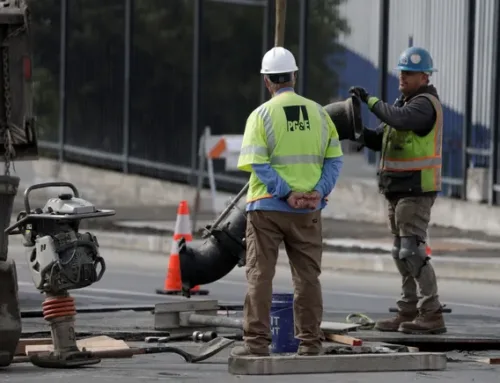Prairie Island Indian Community Crafts Sustainable Cannabis Vision
October 1, 2025
They call themselves Bedwakantunwan, or those who were born of the waters. They are Dakota people and have lived in what is now called Minnesota for thousands of years. Like all Native Americans, their recent history is filled with unrelenting displacement and genocide. This is the Prairie Island Indian Community (PIIC) and their story is one of resilience and regeneration. Now, they’re bringing that history and value system to legal cannabis in Minnesota.
BACKGROUND
The tribe is resilient because they’re still living on this land after fighting countless battles with the United States government, and more recently, power companies. Their reservation land was created by the federal government in the 1880s with the Dawes Act. Yet their self governance as a tribe was not established until the 1934 Indian Reorganization Act, a rare moment of liberal policies for Indian country. The liberal policies did not last long, however, and more broken promises followed.
In the 1950s, a hydroelectric dam was built on their land without permission. The dam flooded about 30% of their reservation. In the 1970s, a nuclear power plant was built on the island without consent. It’s still active today with drums of radioactive waste within a stone’s throw of tribal members’ homes. These encroachments hurt the tribe’s ability to keep members on the island and provide for themselves. Many rational members decided not to live next to a nuke plant.
In 1987, fortunes changed for many tribes in the United States with the Indian Gaming Regulatory Act. This was the law that allows casinos on tribal lands. The PIIC website describes the impact gaming had on their self-sufficiency:
In the 1980s a new buffalo became available for tribal nations and, with it, the hope to become self-sufficient once again and provide for the needs of their people. Tribal gaming has transformed not just the Prairie Island Indian Community but all of Indian Country; it is our new buffalo, providing us with the economic means to be a self-sufficient government, educate our members and fight back against the injustices that continue against our Tribe.
The prosperity that gaming has brought to the tribe has gone into making lives better for the tribal members. The tribe pays for education, including full college tuition for its young people. Healthcare is another benefit offered to tribal members. Other benefits include housing assistance, food from the community garden, a monthly cost of living stipend, and jobs at the casino and other operations. These funds also allow the tribe to buy more land and to diversify into other areas of business, like legal cannabis in Minnesota.
TRIBAL CANNABIS IN MINNESOTA
Tribal cannabis operations in Minnesota are a direct result of the state’s adult-use legalization law in 2023, which removed state-level prohibitions and allowed tribes to exercise their sovereignty in this new industry. The tribes can build cultivation, processing, and retail facilities on their reservations without waiting for the state licensing program to complete its roll out (changing daily).
Unique to Minnesota, the tribes are allowed to have off-reservation facilities as long as they comply with the state licensing rules and requirements. It’s necessary to have a “compact” with the state, which is a contract that governs the rules of the road for both governments ensuring compliance and sovereignty. As of this writing, only two tribes in Minnesota have the state compact, the White Earth Nation and Mille Lacs Band of Ojibwe, but Prairie Island told me they are close to signing theirs.
The tribes have a significant head start over the state-licensed market and may enjoy “first mover” advantage if they execute well. White Earth Nation had the first cultivation facility in Minnesota and provided cannabis to the first tribal dispensaries in the state, including Island Pezi, the dispensary brand for the PIIC.
THE ISLAND PEZI TEAM AND CULTURE
“We make decisions, all decisions, by asking ourselves what will happen with this decision seven generations from now?” said PIIC Cannabis Commission Chair Ed Buck. “Our vision is long-term and driven by taking care of the next generations, the land, and maintaining self determination and national sovereignty.”
This intentionality became clear to me as I toured the cultivation campus and reservation. Not only is the cannabis being grown using regenerative agriculture techniques, a giant solar farm powers the casino. Organic community vegetable gardens abound, and even a growing herd of buffalo reclaim their original place on the prairie. Bald eagles are also part of the family of animals the tribe watches over and supports. All of these rejuvenation efforts are the result of forward-thinking decision-making and the mindfulness of tribal leadership.
When the PIIC decided to make their move into legal cannabis, they needed guidance because they were new to the business of marijuana. And their sustainable vision is rare in the industry today. They also needed advice that respected their self determination and values. Tribal leadership sought out a seasoned consulting group called Honest Cannabis to assist them in building sound business units that met their long term goals.
Ben Halley, co-founder and COO of Honest Cannabis, has been working with tribal nations for a number of years. He understood the values the tribe wanted to bring to cannabis and the strategy needed to execute. “It can be risky to cultivate cannabis using living soil and regenerative practices,” said Halley. “But the turtle wins the race.”
Halley’s experience taught him that cannabis grown in living soil is usually of superior quality and commands a higher price. When over-production and price compression happen in the Minnesota market, Island Pezi may be well positioned to withstand the storm. “There’s usually room at the top,” said Halley.
Honest Cannabis went to work building the team to bring such an ambitious vision to life. The first piece of the puzzle was cultivation. The tribe formed a partnership with Good Steward, along with their master grower and founder Tri Nyguen. Nyguen grew up in Minnesota but moved to Colorado to pursue his passion for growing cannabis. “I made mistakes at first, humbled myself,” he said, “and became emboldened to do better at home in Minnesota.”
When I asked Nyguen how he learned about regenerative farming, he stopped me. “What we are doing is NOT regenerative per the definitions of such siloed standards, but rather an approach that pulls many different theories with the underlying idea that we can always do better.” Nyguen cited Korean Natural Farming and JADAM farming techniques, which empower farmer cooperatives to create their own natural pesticides, fertilizers, and microbial inputs from readily available, local resources.
“Regen in cannabis by its definition can be difficult, even more so at this scale,” said Nyguen. “The current idea of ‘conventional’ farming is actually modern farming that takes away knowledge, promising simplicity but at the expense of soil health, human health, and environmental health.” As I toured the garden, I saw many different plants growing inside the same soil as the cannabis. Basil and sweetgrass were two prominent plants in the polyculture, but there were many others.
Honest Cannabis next needed to find a manufacturing partner for Island Pezi to turn all that processed biomass into finished products. One of the top hemp and CBD manufacturers in Minnesota at the time was North Star Hemp & Carpe Diem CBD. Their founder and CEO, Ben Lipkin, was brought on board to build the Island Pezi manufacturing plant.
Lipkin’s track record in the CBD space was well known in Minnesota. Products ranging from infused pre-roll joints to gummies to vape pen cartridges are all made on-site with the same care as the cultivation facility. When I asked him what the best part of his job was, Lipkin didn’t hesitate. “The people,” he said. “The company culture is top notch and I enjoy seeing people learn.”
The last two pieces to the vertically integrated business puzzle were retail and distribution. Honest Cannabis built the Island Pezi dispensary from their own experience and recommended the tribe also start a distribution arm for the business called Tokahe. Halley’s reasoning was simple. “Diversification,” he said. “We can distribute products for any company in the state, both tribal and adult use, and that revenue stream will help withstand market fluctuations in the supply chain.”
While the PIIC was not the first tribe to come online in the state, their leadership took its time to do things according to their values. I have toured dozens of cultivation and manufacturing campuses since 2016, and I’ve never seen living soil and regenerative practices used at this scale. While there was a small indoor garden, also in living soil, most of it was being grown outdoors or in greenhouses. And it’s being done far north in a cold climate with a short growing season.
Why isn’t this being embraced by more entrepreneurs in the industry? It’s cheaper to build, more affordable to run, the weed is better and commands a higher price. While plant yields may be lower, in the hands of the right team and culture, regenerative practices can be done at scale offsetting those concerns.
The team at Island Pezi are not only building another business for the next seven generations, they may be providing a more sustainable model for the rest of the emerging cannabis industry to emulate.
Search
RECENT PRESS RELEASES
Related Post



